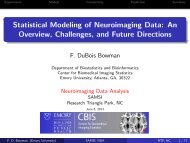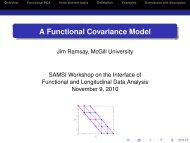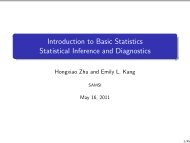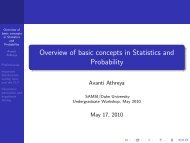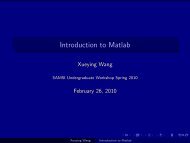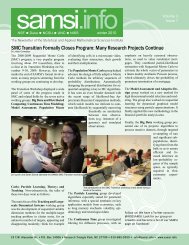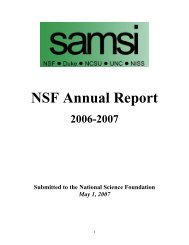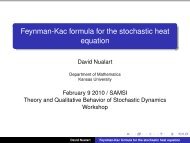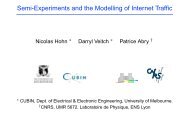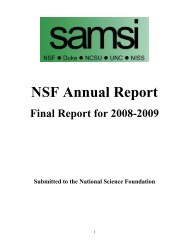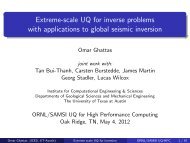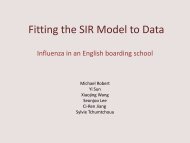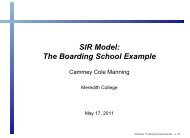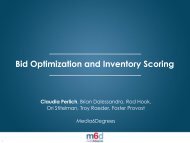- Page 1 and 2:
NSF Annual Report 2007-2008 Submitt
- Page 3 and 4:
Education and Outreach • 2-Day Wo
- Page 5 and 6:
C. Directorate’s Summary of Chall
- Page 7 and 8:
National Leadership and Involvement
- Page 9 and 10:
D. Synopsis of Developments in Rese
- Page 11 and 12:
the efficient treatment of complex
- Page 13 and 14:
c) RANDOM MEDIA Much of the work of
- Page 15 and 16:
2. Human Resource Development SAMSI
- Page 17 and 18:
[it] from time to time.” (M. Rose
- Page 19 and 20:
Undergraduate Workshops 2007-08 Sum
- Page 21 and 22:
3. Education The impact of SAMSI co
- Page 23 and 24:
The working group Climate and Weath
- Page 25 and 26:
oundary method as a means to impose
- Page 27 and 28:
assumed full responsibility for the
- Page 29 and 30:
I. Annual Progress Report The previ
- Page 31 and 32:
Kazi Ito NCSU Mathematics Ralph Smi
- Page 33 and 34:
2007-08 Sensor Networks Transition
- Page 35 and 36:
Environmental Sensor Networks Progr
- Page 37 and 38:
Yang Yu Zhang Zhong Zhu Jun Bin Yi
- Page 39 and 40:
Mattingly McKinley Minion Mitran Ng
- Page 41 and 42:
Cheng Choi Clark Cooley Das Das Del
- Page 43 and 44:
Ren Resnick Rios Cuirong Sidney Jes
- Page 45 and 46:
Rosenblum Rotnitzky Scharfstein Sun
- Page 47 and 48:
B. Postdoctoral Fellows This sectio
- Page 49 and 50:
Administrative Mentor: Michael Mini
- Page 51 and 52:
We consider modeling multiple risk
- Page 53 and 54:
1. Statistics Department Seminar, C
- Page 55 and 56:
Presentations: Change of Spatiotemp
- Page 57 and 58:
Presentations: “Some Thoughts on
- Page 59 and 60:
Theory for multiple change-point se
- Page 61 and 62:
2. Discovering Game Theoretic Conce
- Page 63 and 64:
“Work on numerical large deviatio
- Page 65 and 66:
contributing team member, as often
- Page 67 and 68:
accuracy of the solutions. Some pre
- Page 69 and 70:
Continuing Collaborations: Helen Zh
- Page 71 and 72:
7 th World Congress in Probability
- Page 73 and 74:
N/A 9. Other Research while at SAMS
- Page 75 and 76:
Risk analysis (multivariate extreme
- Page 77 and 78:
Jesus Rios Plans for 2008-10 I will
- Page 79 and 80:
Communication: --a consistent, time
- Page 81 and 82:
C. Graduate Student Participation 1
- Page 83 and 84:
Elijah Gaioni (University of Connec
- Page 85 and 86:
Xiaoyan’s thesis work is on devel
- Page 87 and 88: Jason Wilson (Duke) is involved in
- Page 89 and 90: Ilka A. Reis (National Institute fo
- Page 91 and 92: 4. Challenges in Dynamic Treatment
- Page 93 and 94: 4.5 Program Activities The program
- Page 95 and 96: which held morning and afternoon se
- Page 97 and 98: • B. Carlin (Biostatistics, Unive
- Page 99 and 100: Also following from the program, se
- Page 101 and 102: 4.11 Summary of Exciting Research a
- Page 103 and 104: interested students and faculty, an
- Page 105 and 106: 6. Education and Outreach Program T
- Page 107 and 108: Cherokee Investment Partners, Const
- Page 109 and 110: G. Publications and Technical Repor
- Page 111 and 112: • Ma, C. “Construction of Non-G
- Page 113 and 114: • Bayarri, M.J., J. Berger, F. Li
- Page 115 and 116: • Vernieres, G., Gremaud, P., Olu
- Page 117 and 118: • Krishnapur, M., Zeitouni, O., R
- Page 119 and 120: • Hou, S., K. Huang, K. Solna, an
- Page 121 and 122: • Das, S., “Analyzing Fatal Dri
- Page 123 and 124: H. Diversity Efforts SAMSI puts con
- Page 125 and 126: (University of Utah) and Natallia K
- Page 127 and 128: 2007-08 Random Media Opening Worksh
- Page 129 and 130: 2. Affiliate Involvement 2.1 Backgr
- Page 131 and 132: J. Advisory Committees Committee Na
- Page 133 and 134: Institute directors agree to inform
- Page 135 and 136: analysis of DNA and protein sequenc
- Page 137: University), Jeremy Gunawarden (Har
- Page 141 and 142: Carolina), Gareth Peters (New South
- Page 143 and 144: actually replace individual analyse
- Page 145 and 146: effect parameter of interest prior
- Page 147 and 148: with structures that are not tempor
- Page 149 and 150: about confidence in results. Furthe
- Page 151 and 152: 2. Stochastic Dynamics 2.1 Overview
- Page 153 and 154: Michael Reed (Mathematics, Duke), G
- Page 155 and 156: These two approaches, through the u
- Page 157 and 158: • Li Lexin (North Carolina State
- Page 159 and 160: At NCAR, Boulder, Colorado and orga
- Page 161 and 162: SAMSI working groups. Participation
- Page 163 and 164: certain distances, be used to captu
- Page 165 and 166: subject to the l 1 constraint. Zou
- Page 167 and 168: 3. Breiman, L. (1996): Heuristics o
- Page 169 and 170: enabled high virtual attendance by
- Page 171 and 172: (b) Estimation of large random matr
- Page 173 and 174: We have already discussed problems
- Page 175 and 176: Appendix C. Workshop Participant Li
- Page 177 and 178: Sanso Bruno Male University of Cali
- Page 179 and 180: Compmod New Methods and Case Studie
- Page 181 and 182: El Karoui Nourredine Male UC Berkel
- Page 183 and 184: Education and Outreach Program SAMS
- Page 185 and 186: Sutton Karyn Female NCSU Mathematic
- Page 187 and 188: Lin Rongheng Male U Mass Biostatist
- Page 189 and 190:
Geometry and Statistics of Shape Sp
- Page 191 and 192:
Heo Giseon Female Hirani Anil Male
- Page 193 and 194:
Pennec Xavier Male Pike Brian Male
- Page 195 and 196:
Yasamin Saeid Male Yezzi Anthony Ma
- Page 197 and 198:
Daum Keith Male Idaho National Labo
- Page 199 and 200:
Langstaff John Male Laurey Terri Fe
- Page 201 and 202:
Sedransk Nell Female NISS Statistic
- Page 203 and 204:
Risk PPP Workshop Workshop Particip
- Page 205 and 206:
Rezaei Mahmoud Male Clemson Mathema
- Page 207 and 208:
Lysenko Natalia Female ETH Zurich S
- Page 209 and 210:
Biondini Gino Male State U New York
- Page 211 and 212:
Khatri Shilpa Female Courant Instit
- Page 213 and 214:
Spiller Elaine Female SAMSI Mathema
- Page 215 and 216:
Interface Workshop Workshop Partici
- Page 217 and 218:
Cheney Margaret Female Rensselaer P
- Page 219 and 220:
Agarwal Ankit Male U Kansas Enginee
- Page 221 and 222:
Lahiri Soumendra Male Texas A & M U
- Page 223 and 224:
Last Name SAMSI/CRSC Industrial Mat
- Page 225 and 226:
Reale- Levis Jim Male NCSU Engineer
- Page 227 and 228:
Gray William Male U. North Carolina
- Page 229 and 230:
Serban Nicoleta Female Georgia Inst
- Page 231 and 232:
Brotherson Temitope Female NJ Scien
- Page 233 and 234:
Frink Kaiem Male Elizabeth City Sta
- Page 235 and 236:
Jones Dana Female Bennett College f
- Page 237 and 238:
Munoz Breda Female RTI Internationa
- Page 239 and 240:
Smith Ralph Male NCSU Mathematics F
- Page 241 and 242:
Undergraduate Two-Day Workshop Part
- Page 243 and 244:
Schmidt Courtney Female Georgetown
- Page 245 and 246:
Schaeffer Amanda Female U Arizona M
- Page 247 and 248:
Presentation Chris Snyder, NCAR/MMM
- Page 249 and 250:
Chair of Afternoon Session Tom Sant
- Page 251 and 252:
1:00-2:15 Lunch Chair of Afternoon
- Page 253 and 254:
“Calibration of a Numerical Model
- Page 255 and 256:
model. The output is functional dat
- Page 257 and 258:
santner.1@osu.edu “Optimization o
- Page 259 and 260:
greatly from the active support of
- Page 261:
“Blind Kriging: a New Method for
- Page 267 and 268:
10:00-10:30 Break Characterizing th
- Page 269 and 270:
— hist_pie.m — hist_pie_exercis
- Page 271 and 272:
9:00 Presentations and Discussion
- Page 273 and 274:
11:25-11:55 From Population to Indi
- Page 275 and 276:
4:00 - 5:30 Shapes in Medical Imagi
- Page 277 and 278:
4:15 - 4:45 Discussion Panel Wednes
- Page 279 and 280:
dcremers@cs.uni-bonn.de “Shape In
- Page 281 and 282:
We will construct epsilon entropy e
- Page 283 and 284:
Department of Statistics flb@stat.w
- Page 285 and 286:
University of California Los Angele
- Page 287 and 288:
2:45 - 3:15 Break N. D. Shyamal Kum
- Page 289 and 290:
2:15 - 4:00 Working Group Formation
- Page 291 and 292:
and public health questions; little
- Page 293 and 294:
Howard Kunreuther University of Pen
- Page 295 and 296:
series. We propose a specific class
- Page 297 and 298:
Interface Tracking in Connection to
- Page 299 and 300:
Purdue University Center for Comput
- Page 301 and 302:
of the solution. Here we reveal a s
- Page 303 and 304:
of the grand challenges of science.
- Page 305 and 306:
numerical approach. Several example
- Page 307 and 308:
Biofilms are complicated, living co
- Page 309 and 310:
Knut Solna University of California
- Page 311 and 312:
This poster presents an analysis of
- Page 313 and 314:
X. Program on Risk Analysis, Extrem
- Page 315 and 316:
SPEAKER ABSTRACTS Chair: David Bank
- Page 317 and 318:
Thoughts on the Use of Decision Ana
- Page 319 and 320:
Bias Correction in Pharmaceutical R
- Page 321 and 322:
In the talk we will discuss some mo
- Page 323 and 324:
Stephen Sain, National Center for A
- Page 325 and 326:
Concha Gomez, University of Wiscons
- Page 327 and 328:
Iris Mack, Phat Math, Inc. and Flor
- Page 329 and 330:
8:15 - 8:45 Continental Breakfast a
- Page 331 and 332:
coordinate grids on the surface. To
- Page 333 and 334:
University of California, Irvine De
- Page 335 and 336:
overall a good agreement between im
- Page 337 and 338:
9:00-9:05 Alan Karr, National Insti
- Page 339 and 340:
3:30 - 4:00 Coffee Break Soumen Lah
- Page 341 and 342:
“Experiences in Developing an Eco
- Page 343 and 344:
Jennifer Hoeting Colorado State Uni
- Page 345 and 346:
kogle@uwyo.edu “Data-Model Integr
- Page 347 and 348:
“Compression and Analysis of Gold
- Page 349 and 350:
"A Cost-Efficient Approach to Wirel
- Page 351 and 352:
The main goal of a data collection
- Page 353 and 354:
Wednesday, January 23, 2008 Radisso
- Page 355 and 356:
“Robust Prediction Error Criterio
- Page 357 and 358:
one of the main sources of uncertai
- Page 359 and 360:
other. A core problem is how to inf
- Page 361 and 362:
"The Asymptotic Structure of Nearly
- Page 363 and 364:
SAMSI madar@post.tau.ac. “Bayesia
- Page 365 and 366:
11:30 - 12:00 Discussion Session 12
- Page 367 and 368:
garnier@math.jussieu.fr “Wave Pro
- Page 369 and 370:
has lagged. While it is quite clear
- Page 371 and 372:
Appendix E - Workshop Evaluations E
- Page 373 and 374:
E.2 Evaluation of Scientific Conten
- Page 375 and 376:
E.3 Evaluation of Staff Percent of
- Page 377 and 378:
E.5 Evaluation of Lodging Evaluatio



